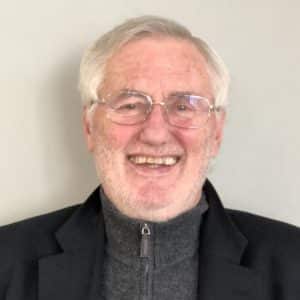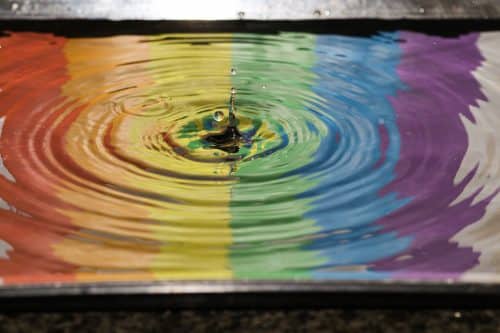
Gov. Sarah Huckabee Sanders of Arkansas recently said she’s “excited” to welcome more people into the state — but she has a dismal record in relating to the gay community. Eureka Springs, the home of the Great Passion Play, is also the gayest city in Arkansas as rainbow flags fly from every Victorian home. There are four Pride celebrations each year.
Rodney Kennedy
Maybe, like me, Sanders has attended the Great Passion Play in Eureka Springs. According to the nonprofit foundation’s web site, the Great Passion Play is dedicated to providing opportunities for people to deepen their knowledge of the heritage, teachings and inspirations of Jesus Christ and the Christian faith. The Great Passion Play serves as a spiritual center for Christians worldwide and is home to the Christ of the Ozarks Statue (7-stories tall), the Parables from the Potter, the interactive Holy Land Tour, the Sacred Arts Museum, the world-renowned Bible Museum (over 6,000 Bibles in 625 languages including a page from the Gutenberg Bible), the History Museum, hiking trails, Noah’s Ark Park Petting Zoo, David the Shepherd, the Great Hall Buffet, and gift shops.
The proximity of the cross at the Great Passion Play and the gay pride flags that fly from the homes in Eureka Springs presents a disorienting message. The cross and the rainbow flag are separated by nearly 2,000 years. The cross is the universal symbol of the Christian faith; the rainbow flag is the paradigmatic symbol of gay pride.
The cross represents a message of hope and salvation; the rainbow flag reflects the hope of the LGBTQ community. Nowhere do the two symbols clash more than in Eureka Springs. The governor of Arkansas welcomes people who are not gay. She has made it clear that her welcome excludes people who are not straight, white, Christian, and Republican. Her welcome corrupts the meaning of the cross.
St. Paul says that Jesus “died for the ungodly” — meaning all human beings. In his obedience to death on the cross, Jesus died to set all humanity free — the many, “whosoever will.” This is not the message now promoted by the state of Arkansas.
I want to explore the similarities between the cross and the rainbow flag. What is at stake is the credibility of the Christian faith and the promise of the cross as the symbol of a salvation that is for everyone.
For centuries LGBTQ+ people have been victims of unspeakable exclusions, persecutions, imprisonments, murders, and abuses. The gay community was forced to hide in an alternate culture. They were like the faithful of God who were “tortured, refusing to accept release, in order to obtain a better resurrection. Others suffered mocking and flogging, and even chains and imprisonment. They were stoned to death, they were sawn in two, they were killed by the sword; they went about in skins of sheep and goats, destitute, persecuted, tormented — of whom the world was not worthy. They wandered in deserts and mountains, and in caves and holes in the ground.”
To forget these atrocities leaves us with a fraudulent view of our culture and calls into question our commitment to the cross as the meaning of the Christian gospel in this nation. The exclusion of LGBTQ+ people makes a mockery of the cross. Jesus died to make a place for all people, including gays, straights, and transgender persons. The pride and joy of the evangelical community has always been the substitutionary theory of the atonement — the idea that Jesus was our substitute. He, according to this view, died in our place.

Jordan McDonald / Unsplash
In a recent look at Jesus’s words in John 14:1 – 6, I was struck by the prominence of the word “place.” I realized that Jesus died to make a place for all people. When he told the disciples that he was going to make a place for them, he was telling them that he was on his way to the cross. All four gospels testify that the officials of the state brought Jesus to his “place,” and that place is called Golgotha. Jesus went to the cross to eliminate culture’s vertical discriminations.
As New Testament scholar Dominic Crossan points out, “The Kingdom of God as a process of open commensality, of a nondiscriminating table depicting in miniature a nondiscriminating society, clashes fundamentally with honor and shame, those basic values of ancient Mediterranean culture and society.” That puts it exactly right. The cross clashes with all human attempts to put people in their place, keep people in their place, deny people their place. Jesus came to give everyone a place.
Jesus knows the pain of being denied a place. Having no place plagued Jesus from before his birth. There was “No place” for Mary and Joseph in the inn. He came unto his own and his own received him not. Jesus once said, “Foxes have holes, and birds of the air have nests, but the Son of Man has nowhere to lay his head.” Jesus always understood the pain and agony of having no place.
Governor Sanders’s not-so-welcoming invitation rips the stitches from the scars that have been inflicted on the gay community forever. She forcefully reminds everyone, with her “fake” welcome, that not everyone has a place. There are always smiling people, like Governor Sanders who will put you in your place, tell you if you are out of your place, and punish you for daring to break the barriers of place.
Yet flying in her face, in Eureka Springs, Hot Springs, Little Rock, Fayetteville, and Conway (the five gayest cities in Arkansas), the rainbow flag waves in the direction of horizontal relationships by eliminating the human ladder of success. No one is on the bottom rung because in the kingdom of God there are no rungs. There’s no ladder. Our spatial theology is horizontal — a level plane for everyone.
As more states in the U.S. pass freedom-denying, democracy-insulting laws of exclusion and punishment, there’s always the hope represented in the actual message of the cross, a message of welcome to everyone. After all, Jesus insists that in his father’s house there are “many rooms.” To the people who are so frightened by diversity and globalization, to them I say, “Many rooms.” To the people who are frightened by the inclusion of gays and transgender people, “many rooms.” There are many rooms.
Until we can see the cross and the rainbow flag together, until we can identify Christ with a community of excluded people, once forced to hide in closets, there can be no genuine understanding of Christian identity in America, and no deliverance from the brutal ugliness.
Rodney Kennedy has his M.Div. from New Orleans Theological Seminary and his Ph.D. in Rhetoric from Louisiana State University. The pastor of 7 Southern Baptist churches over the course of 20 years, he pastored the First Baptist Church of Dayton, Ohio – which is an American Baptist Church – for 13 years. He is currently professor of homiletics at Palmer Theological Seminary, and interim pastor of Emmanuel Friedens Federated Church, Schenectady, New York. His sixth book – The Immaculate Mistake: How Evangelicals Gave Birth to Donald Trump – is now out from Wipf and Stock (Cascades).

